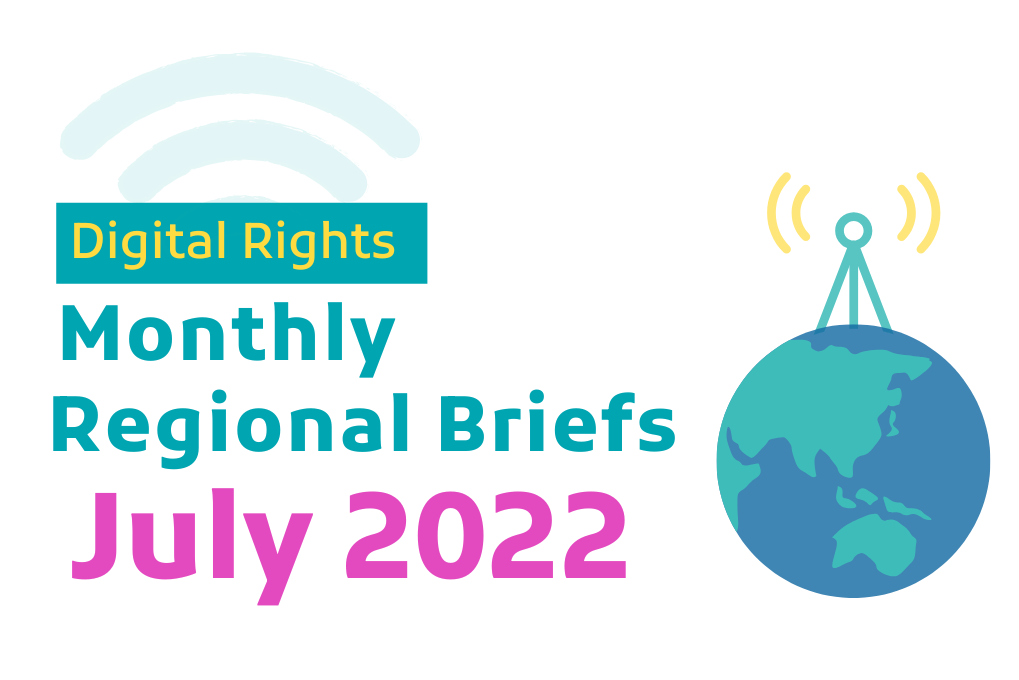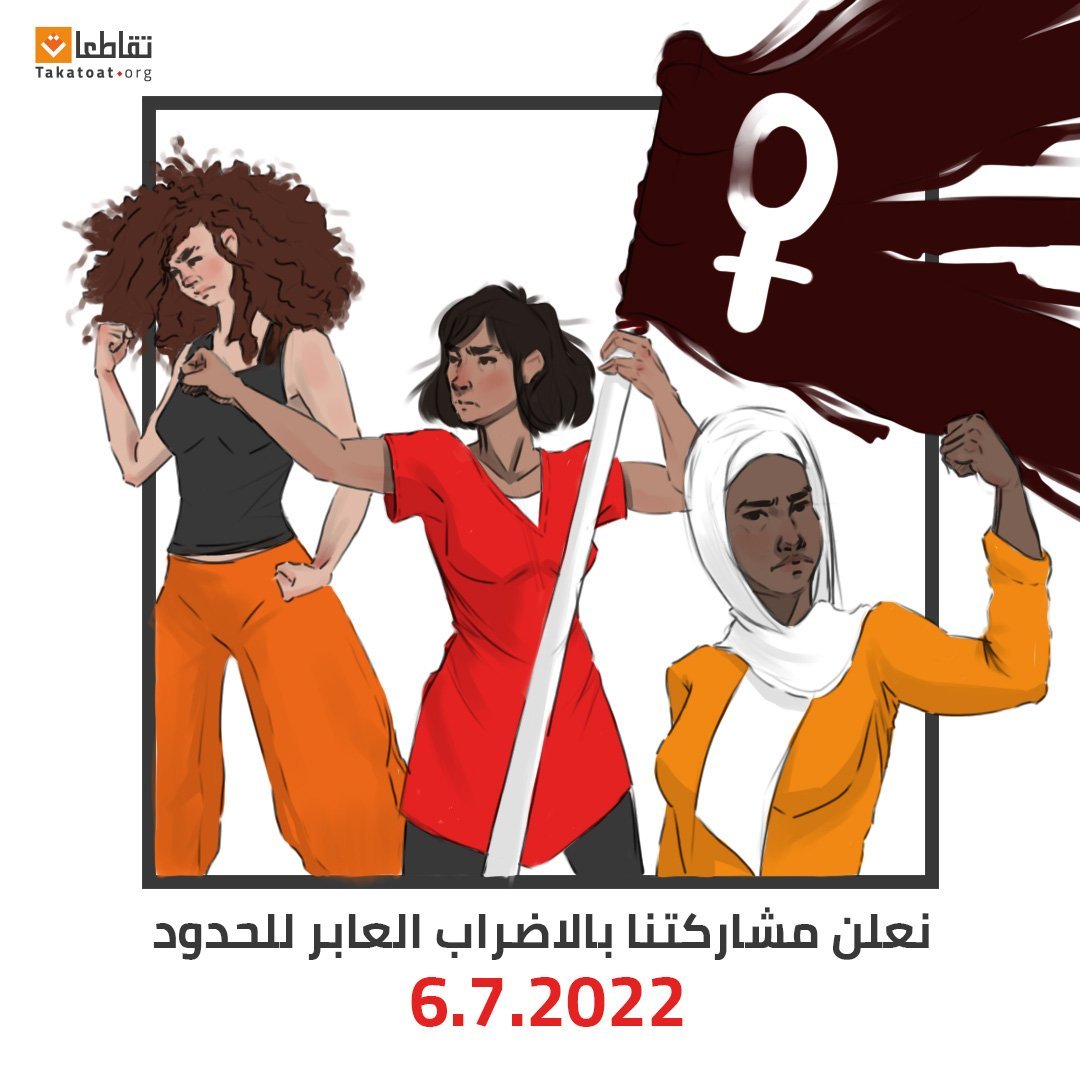July 2022 | Digital Rights Regional Briefs
Danae Tapia, Global Community Manager & Resident Hechicera
Our regional briefs for the month of July are out!
Below you can find the latest news on digital justice issues in the Latin America, MENA, Africa and Asia region. Each dispatch contains information on Current Opportunities for Digital Rights Defenders, Emerging Topics on Digital Justice, Community News, Regional News And Updates. This time our researchers covered issues affecting our communities ranging from a massive data breach in Kenya to an explanation of laws related to VPNs in India.
Do you know about groups or individuals working on topics that should be highlighted in our briefs? Then do not hesitate to contact us! We are especially interested in issues that are not usually covered in the digital rights field in order to foster a wider and more heterogeneous space.
Danae
Global Community Manager
Asia Regional Brief
Africa Regional Brief
Latin America Regional Brief
MENA Regional Brief
..
Author: Mardiya Siba Yahaya
Mardiya Siba Yahaya is our Africa Community Lead. She is a feminist digital sociologist, researcher , learning designer and storyteller whose work examines the internet and its cultures from the margins of gender and location. She has a Global Challenges degree from the African Leadership University, was awarded the Mandela Rhodes Scholarship in 2021, and is currently awaiting her Masters Degree in Sociology from the University of the Witwatersrand.
Africa Regional Brief
Current Opportunities for Digital Rights Defenders
The Tony Blair Institute for Global Change is looking for Progress Fellows to work on fresh technology policy ideas including matters related to AI and ML, space manufacturing, governance, satellites,Web3, biotech, digital government and clean tech. The deadline is 7 August 2022. Apply here
IT for Change invites applications for a five-day residential institute on Frontiers and Frames for a New Digitality. The institute is part of IT for Change’s School of Digital Justice, a pedagogical vehicle to further the vision of re-imagining and realizing socio-structural transformation for a just digital economy. The deadline to apply is 10 August 2022
Emerging Topics on Digital Justice in Africa
Artificial Intelligence (AI) In the City: Building Civic Engagement and Public Trust
In past regional briefs, we explored concepts regarding digital anthropology and emerging conversations regarding AI in the context of Africa. That includes biases in AI technology against African communities, current AI governance frameworks, and opportunities for creative and innovative anthropological research and work.
This collection of essays edited by Ana Brandusescu and Jess Reia brings together conversations on AI governance, policy and questions surrounding digital anthropology to context. For instance, one essay on the meaning of civic engagement suggests that involving people throughout the process - i.e. from the ideation and design stages - could have more impact compared to being included towards the final stages or at the implementation stage of smart cities. The collection also delves into questions of trust in AI technologies and their governing principles, while questioning the power dynamics that exist within our society that play a role in how different stakeholders engage.
Similarly, questions of trust are explored through an anthropological lens of people’s everyday lives and contexts. The issue of trust is assessed using gendered, locational, sexuality, and racial perspectives by asking how certain groups can trust technologies deployed in their lives and environments if the very governments and systems designed to protect their well-being actually puts them at risk? How do we as technologists expect to build trust when the people whose lives are impacted and shaped by the AI technologies are themselves not involved in the research, ideation, and design processes?
AI Conversations Around Africa Region
According to Chenai Chair, the conversation surrounding AI in Africa usually focuses on one, “its capabilities for economic growth, including how it can increase production and reduce labor”, and two, “the regulation of data processors and data controllers and the ways in which people’s data can be protected in order to give effect to the rights of privacy and access to information”. In this way, Chair argues that public trust is focused on those who build the AI rather than the people it is built for.
The opaque nature of decisions regarding AI technology deployment in cities, their uses for surveillance and control purposes, and the risk of harms against gendered, sexual and racial minorities deepens public mistrust. For example, Neema Iyer shares cases where the Ugandan government rolled out digital IDs and installed CCTV cameras across Kampala without public consultation, rights-based tests or risk assessments.
Altogether, the essays leave a reflection on how we can expand meaningful civic engagement, center the social and geo-political contexts while accounting power dynamics as we design, create, engage and continue to deploy AI technologies in our cities.
While AI in Africa is still in its early stages, as acknowledged in the anthology, this body of work provides a clear view and foundational conversations for further research on the field of AI, participatory and inclusive design, and digital anthropology in Africa.
Community News in Africa
Solidarity with Sudanese Protesters, Activists, Feminists and Human Rights Defenders
In the past few weeks Sudanese protesters have taken the streets demanding a return to civilian governance and justice for the killings that happened in 2019. The digital rights community members based in Sudan shared that they were disconnected from the internet on 30th June, leaving only big corporations with connectivity through VSAT (Very-small-aperture terminal). Rights defenders share that they risk arrests each day they participate in the protests.
How you can help: You can support Sudanese activists by sharing the news or documenting the realities on ground. You may also support them by providing activists and protesters within the network efficient and easily accessible, and usable digital security resources, and manuals on participating in protests. Similarly, you may help by providing financial support, safe-housing to people at risk and other resources to activists on ground.
Regional Update
Threats Against Data Privacy in Kenya
In the past few months, Telcos in Kenya have threatened to deactivate citizens’ numbers and mobile accounts if they do not provide additional data in the form of biometric information. The Telcos argue that this is a requirement of Kenya Information and Communications (Registration of SIM-Cards) Regulations, 2015. However, this recently published article by AccessNow, provides evidence from the regulation which shows that the Telcos’ claims are a misinterpretation of the law and a breach to people’s privacy. Safaricom, which is one of the leading Telcos in Kenya, was found to be involved in a data breach which it refused to take responsibility for. Similarly, other research on data privacy highlighted cases where digital lenders scrap peoples phone data including contacts, sms, mobile money transactions and more. The lenders often use this data to socially shame people who do not pay back on loans in countries such as Kenya and Nigeria, and more recently Ghana. Collectively, these cases demonstrate instances where people's information have been used to target them.
Technology-facilitated Violence Against Women Leaders
A Pollicy report called ‘amplified abuse’ explores the online violence women politicians face in Uganda. Similarly, Nina Jankowicz explored gendered and sexualised disinformation against women in public life which highlighted targeted abuse against women in leadership and rights defenders. AccessNow also covered a story on cases of online doxxing against women judges in Tunisia. Women leaders, journalists and women human rights defenders continue to be targets of technology-facilitated violence. The cases of doxxing in Tunisia were reported to be tactics used by the supporters of the Tunisian President Kais Saied. Judges who speak against the President's anti-democratic actions risk public shaming by publicizing their personal information with the goal of tainting their reputation. While Tunisia has written a data protection legislature, enforcement of privacy and data protection laws remain weak, leaving vulnerable communities and social groups at risk.
...
Author: Astha Rajvanshi
Astha Rajvanshi is an independent journalist based in Mumbai, where she writes on gender, marginalized communities, and human rights across India and South Asia. Recently, she was awarded the Matthew Power Literary Reporting Award by New York University. As part of her reporting in India, she is currently examining tech surveillance and internet shutdowns. Previously, she was a Fellow for the Institute of Current World Affairs in Washington DC. She has also worked for the New York Times Magazine and Reuters in New York. She was born in New Delhi and raised in Sydney as a proud daughter of immigrants.
Asia Regional Brief
Current Opportunities for Digital Rights Defenders in Asia
EngageMedia is hiring an Event Manager to oversee the Asia-Pacific Digital Rights Festival and other events. Apply here by August 4, 2022. EngageMedia is also hiring a Digital Rights Project Officer to support their initiatives in Thailand and the Mekong region. Apply here.
Applications are now open for Point of View’s “The Digital Everyday” 3-month online course by The course centers bodies as the site where gender, sexuality, and the “digital everyday” is shaped. Apply here by August 8, 2022.
The Digital Rights Foundation (DRF) is collaborating with the HateLab (University of Cardiff) to conduct a study on the experiences of gendered disinformation that women journalists in Pakistan face on Twitter. For further information about the study, you can email at mariem@digitalrightsfoundation.pk. Link to survey here.
EqualityLabs is looking for a publicist to help with the book tour of the release of their upcoming book, The Trauma of Caste: A Dalit Feminist Meditation on Survivorship, Healing, and Abolition (out on Paperback on November 15, 2022).
The Tor Project is developing a functionality ("Connection Assist") in Tor Browser to support automatic censorship circumvention in restricted/censored regions. They are looking for people particularly in Tibet, Hong Kong and China to help test it. Interested volunteers can e-mail nah@torproject.org.
NetFreedom Pioneers is hiring a Program Manager for their East Asia Programs. Apply here.
Emerging Topics on Digital Justice in Asia
Explained: India’s new VPN rules
In Asia, virtual private networks (VPNs) that anonymise a user's Internet Protocol address and help bypass firewalls are used to resist government restrictions, often to unlock Western content and specific social media sitesIn China, VPN software helped internet users get around President Xi Jinping’s Great Firewall to curb restrictions around censorship and surveillance. InMyanmar, citizens have turned off location settings and used encrypted messaging apps, foreign SIM cards and VPNs to organize protests and document human rights abuses since the military coup in February 2021.
But in the last two years, many digital rights activists have expressed alarm over an increasing number of crackdowns on VPNS.In countries like China, Myanmar and India, governments are introducing new cybersecurity measures which aim at complete control of electronic communications, data protection and VPN services in the country.
India witnessed a huge surge in the number of VPN users with a roughly 670% increase during the first half of 2021, partly attributed to the rapid growth of India’s internet user base.
India witnessed a huge surge in the number of VPN users with a roughly 670% increase during the first half of 2021, partly attributed to the rapid growth of India’s internet user base. The latest measure to restrict VPNs use happened this past April, when the Indian government passed a new directive ordering tech companies to maintain detailed logs on the use of VPNs starting June 27. Passed by the Computer Emergency Response Team (CERT-In), the rules require VPN and cloud providers to collect and store user data including names, addresses, contact numbers, email addresses and IP information and usage patterns for up to five years.
The rules have been met with resistance from many activists and companies, who say they violate the digital rights of citizens. Experts suggest that prominent global players are unlikely to comply, since the government restrictions go against the core purpose of their services i.e. to provide privacy and anonymity. Global VPN giant NordVPN, which operated 28 servers in India, has already pulled out of the country. The company's head of public relations told Nikkei Asia that "[w]e stand for secure and private access to the internet."
We spoke with Tejasi Panjiar, an associate policy counsel at the Internet Freedom Foundation, on what these developments mean for the digital rights landscape:
Hi Tejasi! Please give us a general rundown on what’s happening with VPNs in India.
VPNs had been seeing steady growth in terms of usage not just by Indian users, but also by businesses and the Indian governments. We have around 70 million users in India and in 2021, India saw 270 million VPN installations, which is 20% of the Indian population and a year-on-year growth of 6-7%. That was huge.
But in April 2022, the conversation around VPNs in India took a very major turn when the government introduced very excessive data collection requirements. Seen from a digital rights perspective, VPNs are a privacy measure. They help to protect information security in multiple ways: they're used by businesses and governments to secure confidential information; they're used to secure digital rights of journalists and activists; and then there are general users who want to stay safe by using public wifis or to sidestep arbitrary blockings of websites. So here’s where the conversation really started around the implications and harms. All of this is happening in the absence of a data protection law and in the absence of sufficient oversight – there’s no framework underlying it.
Who exactly would these laws affect?
Image’s source: © Raimond Spekking / CC BY-SA 4.0, via Wikimedia Commons.
A few weeks after these directions were released, the government released a FAQs document clarifying who these laws were going to affect. They mentioned that the rules weren't going to affect commercial VPN providers, which means they will be affecting individuals. Essentially, a commercial company like Microsoft using their own VPN to secure confidential information that they use by conducting business is not going to be affected. But if you or I–say, a journalist, lawyer or activist– use VPNs, this is a very advancing tool for them.
Moreover, the FAQs said that the ambit of the scope of these directions now also includes foreign service providers, which means that it doesn't matter if the VPNs have their IPs hosted in India, or have their jurisdiction in India–even if they don't, they will have to face non-compliance. So it's essentially affecting even foreign service providers and basically any entity connected to the internet – it's extremely wide. It refers to data centers, VPNs, cloud service providers. The scope of it is also not defined – it’s a “one size fits all” approach.
From the perspective of VPN providers, some of them came out to say they don't store this information and the rules were against their policy. How will commercial providers be expected to address that situation?
Initially when someone used to ask me this question, my response was, ‘I think it's going to be extremely difficult for the government to successfully enforce these directions’. There are certain providers such as Signal for instance, or VPNs such as Proton, which claim they don't retain any logs due to privacy respecting practices. But there are very severe penal provisions for non-compliance. Which would mean that these service providers would have no option but to exit from the Indian market. Cut to today, these directions have seen three or four VPNs quit their servers in India.
“There are very severe penal provisions for non-compliance. Which would mean that these service providers would have no option but to exit from the Indian market. Cut to today, these directions have seen three or four VPNs quit their servers in India.”
That's the thing, we don't know where this is going to go from here. We don't know how privacy is going to be balanced with so-called intent to strengthen cyber security. The penal provisions, combined with the excessive data collection requirements, mean VPN service providers have no other option but to comply or leave the country.
You’re saying that there's an expectation, at least from people watching this space, that more companies will either quit or comply.
Right. And complying would essentially mean changing the very nature of their mission or the intent behind providing a VPN in the first place. In some ways it defeats the entire purpose.
Are there other providers that have decided to maintain their presence in India at the moment? And what have you noticed in terms of their response?
The cybersecurity directions will become effective from 25th September in its entirety only for micro, small and medium enterprises (MSMEs). Basically, certain enterprises that are very, very small in scale that do not have the capacity to store the technology to suddenly store logs. You need time to build that capacity. Which is why three providers have already left the country. Some have asked us for more time, some have left the market and some are still figuring out. They're either discussing a middle ground with the government, because it's a difficult decision since India has such a large market base.
I'm wondering if [companies quitting] has any impact on the government's decisions?
This isn’t the first time – even a suggestion of banning VPNs in 2021 saw the industry responding with concerns, saying that this would be very counterproductive.
As soon as the directions were released we saw a lot of pushback from the industry. This isn’t the first time – even a suggestion of banning VPNs in 2021 saw the industry responding with concerns, saying that this would be very counterproductive because they employ VPNs as businesses and organizations to conduct our business remotely and use it to secure sensitive information. The problem is that we understand the intent–they've made very clear that they’re doing it for cybersecurity–but the way they've done it is by asking the providers to maintain excessive customer data. It is ultimately harming individuals’ right to privacy. Before laying out the proposal, they should have sought legal opinion and opened it to public consultation, and that process should have included technology, cybersecurity, experts, industry, and civil society with a special focus on digital rights because the harms were overlooked.
Is the government essentially not cognizant of the fact that it is harmful to human rights?
Which is why a public consideration is so important to raise these concerns. The industry voicing its concern has been very, very prominent.
Once this regulation comes into place, what sort of workarounds will VPSs use to serve individuals here in India?
That could be three instances.
One is that these VPNs and VPSs could basically shut their physical servers in India. We might still be able to use their services in India, but we wouldn’t be able to use their VPN services or VPS services for browsing Indian websites out of India. For instance, I can still use a VPN to access sites that have arbitrary geo-blocking that are UK based. But say, if I'm in the US, I can't access Indian websites by putting in a US location if they've pulled their services from India or shut their physical server in India, which is mostly what's happening.
The other two possibilities is that they either completely disallow Indian users from using services no matter where we are, or that they would block the source provider altogether, which would also mean we won't be able to access it, but that is a bit unlikely.
How do you expect the government to actually use the information that it might extract from these companies to penalize individuals?
There is a data collection requirement – the kind of data that they're collecting is customer data. Not just your names, IP addresses and phone numbers, but your ownership, pattern of subscribers, or customer hiring services. All of that combined with the data retention requirements that they have, which is five years, or more than five years as mandated by the government, which could be anything.
There is a data collection requirement – the kind of data that they're collecting is customer data. Not just your names, IP addresses and phone numbers, but your ownership, pattern of subscribers, or customer hiring services.
These directions also say that this data shall be maintained within the Indian jurisdiction, which means a copy of the data must be stored in India. Right now, this is a cost concern because data localization can stifle innovation and add compliance costs, because it would deter foreign companies from bringing the services and products to India. Excessive data collection, retention and localization requirements in the absence of oversight and regulatory framework raise concerns of state sponsored mass surveillance. On what circumstances are there checks and balances in the absence of a data protection law? There's no right to your right.
To be clear, the government is not saying individuals can't use VPNs, it's just saying if we have the information, we will use it to monitor activity.
Yes.
Do you think that they will actually then go after individuals?
All this data that's being collected is being used in the name of securing cybersecurity. But if you have my information as a subscriber to any service, you have my information even after I've deleted my account. It can be used for multiple things. We have already seen a lot of instances where there's a chilling effect on freedom of speech and expression.
From your perspective as a digital rights defender, what are people thinking about how to approach the use of VPNs?
It's tough to say how as we’ll have to wait a little longer since these directions aren’t going [into] affect everybody yet. We’ll have to see how MSMEs are responding to it, because at the moment they've asked for a 300-day-long extension. But is that enough to build up the capacity that's needed for such excessive data requirements and infrastructure building? And we still will have to comply with these excessive data detention and collection requirements – so this is just basically delaying the inevitable.
For a certain community like journalists or activists, this is significantly going to affect their freedom to access and to basically feel safe on the internet. On the other hand, we know that commercial VPNs aren’t affected. VPNs are also a key tool in the fight for net neutrality because they allow users to sidestep arbitrary blockings or websites which are without any legal basis.It's also possible that providers are able to circumvent the restrictions where it’s like a cat-and-mouse game. Someone’s VPNs or IP address keeps changing to evade the restrictions. So the government would have to keep identifying the IP addresses of virtual service providers and then block them.
I think what people have been feeling, and it's not just in this context, but a lot of things that have happened in this space recently is that a lot of these regulations and directions are coming in without having open fair discussions with a diverse set of stakeholders. It just hit you in the face.
Community News in Asia
The World Wide Web Foundation released a new Meaningful Connectivity report. It looks into the boundary between meaningful connectivity and basic internet access.The report reveals shockingly low numbers for meaningful connectivity in nine low and middle income countries across the globe. Read the main takeaways here.
Civil society groups in India have urged the government to withdraw the amendments proposed to the IT Rules 2021. These new revisions add concerns to already restrictive provisions that pose a direct threat to digital rights.
Not Just a Number is a documentary by Tudla Productions that looks at how the Philippines' largest broadcast network ABS-CBN was forced off air in 2020. You can now watch it on Cinemata here.
Regional News & Updates in Asia
Twitter filed a new lawsuit this month against the Indian government, seeking judicial review of orders issued under the IT Act, a broad law that has been used by authorities to censor political, social, and religious speech. Read a statement by Freedom House in response to the lawsuit The Freedom house released a statement in response to the lawsuit. This Op-Ed by the LA Times says the case is about “universal free expression, and a much-needed example of a company wielding its power and influence in an attempt to resist government censorship.”
India's Supreme Court granted interim bail to Mohammed Zubair, a leading fact-checker and journalist, after he was arrested on 27 June over a 2018 tweet for "insulting Hindu religious beliefs". Zubair gave an interview to the Hindustan Times after his release.
A new law in Indonesia allowing the government to censor “problematic” online content has raised concerns over freedom of speech, as global tech giants accede to authorities’ requests to avoid a total ban on their services.
Overrun by influencers, historic tourist and religious sites are banning TikTok creators in Nepal, putting up “No TikTok” signs to keep creators from shooting at the premises.
Zayed Siddiki explores how Bangladesh authorities wielded a controversial law to censor free speech and harass those criticizing the government’s pandemic response.
Author: Úrsula Schüler
Úrsula Schüler was born and raised in Chile, South America, where she studied Journalism and worked in media and various organizations for seven years. Spanish is her first language and years ago she was a student representative in high school and her university. After this, as a journalist, she reported two presidential and legislative elections for national media in Chile. She worked in newspapers, a television channel website, and internal communication for universities and companies. Currently, she is studying a postgraduate program in Digital Media Marketing, in Toronto, Canada.
LATAM Regional Brief
Current Opportunities for Digital Rights Defenders in LATAM
IT for Change released a call for applications for the first residential Institute from their School of Digital Justice. They are inviting applicants from the Global South for a 5-day intensive training in Thailand on Frontiers & Frames for a New Digitality It will take place from October 28 to November 1, 2022.
Laboratorio Sapiens from Guatemala is calling for applications to Tecnorizoma, a learning and collaborative creation platform. The call is addressed to civil society organizations interested in incorporating the political discussion about the impact of digital technologies and the Internet into their lines of action. Tecnorizoma will start on August 17 and the call is open until July 30, 2022. Apply here.
Call for contributions to the 1st Online Congress of Popular Education and Free Technologies, which will take place from October 17th to 21st.
Call for Applications from the Rosa Luxemburg Foundation’s International Research Group on Authoritarianism and Counter-Strategies (IRGAC) for postdoctoral fellowships at research institutions in countries in the Global South. Application deadline: 24 August 2022.
The Latin American Network of Digital Anthropology has a call for contributions to the II Latin American Meeting of Digital Anthropology: "Expanding Futures". The space will include presentation tables, keynote talks, workshops and a hackathon to work on challenges where technology is the protagonist. The event will be in a hybrid format on December 14, 15 and 16, 2022, at the School of Design of the Pontifical Catholic University of Chile.
Derechos digitales is inviting organizations or activists without a formal affiliation working locally on digital rights issues in Latin America to pre-register and submit their applications to the Rapid Response Fund for the protection of digital rights in Latin America (FRR). Pre-register here and make project proposals here.
Emerging Topics on Digital Justice in LATAM
WhatsApp pay and the financial data monopoly threat
Have you ever thought about how many active users WhatsApp has and how Meta (WhatsApp, Facebook, and Instagram owner) would introduce a payment system in this application?
WhatsApp is the most used messaging application in the world, followed by the Chinese WeChat. Used in over 150 countries, it has already accumulated more than 2 billion users. There are over 487 million WhatsApp users in India alone, making it the leading country in audience size. The second-ranked is Brazil with 118.5 million WhatsApp messenger users.
In this context, the company has decided to test a payment service with pilots in India and Brazil. Both countries present the biggest user, are both populous countries from the Global South, and lack strong personal and financial data regulation.
But how is the crosslinking between the user’s commercial data from WhatsApp, together with their preferences and interests, already collected on Facebook and Instagram?
Meta offers behavioral users’ data (from Facebook and Instagram) to other companies for marketing and sales purposes. They are constantly collecting big databases about their users and they are developing machine learning systems for predictive purposes. They will now be able to collect social media and financial data through WhatsApp and its two successful social media networks, and crosslink it in a vertical and oligopolistic way among their competitors and users.
The Brazilian case and the zero-rating agreements
For more context, we talked to Vanessa Koetz who co-authored the study “Whatsapp Pay: The next frontier for the expansion of data monopoly”, together with Bianca Kremer and Joana Varon from Coding Rights.
Vanessa highlighted that Whatsapp is installed in 99% of smartphones in Brazil, followed by Instagram (82%) and Messenger (76%). Therefore, Facebook “is responsible for the three main apps that are in our daily lives” i.e. family, affective, professional, commercial communication, etc.
She explained that “one of Facebook's market strategies to reach this dominant position in the country was the zero-rating agreements with telecom operators. This means that users can access the app without being discounted from their data franchise -- which in Brazil is extremely expensive compared to the national minimum wage - contributing to the popularity of Whatsapp”.
In other words, people who use WhatsApp in Brazil do not spend their Internet data. Therefore, WhatsApp pay will be a growing oligopoly taking advantage of unequal conditions.
It is going to be a “digital payment tool, available without time/day restrictions, accessed without financial cost in internet connection plans” with an already huge market power and on a worldwide scale. On the other hand, consumers without WhatsApp, or consumers who decide to pay by their bank account will be charged. “This is a huge competitive advantage and countries like Canada, Norway, Holland and Chile have banned this big tech practice”, Vanessa Koetz said.
According to the researcher, “So far, Whatsapp Pay has not been a success in the country”. She explained that the Brazilian Central Bank's authorization of operation was restricted to transactions between people and commercial transactions were forbidden “but it is possible that the Central Bank will review this prohibition and Whatsapp might consolidate itself as one of the main e-commerce platforms.”
The threat is there and Vanessa commented that this potentially enormous market power “can result in abusive practices favoring its own services and products; the imposition of difficulties and barriers to the arrival of other competitors, and, based on its hegemony in the market, the decrease in the quality of its services – such as the interruptions in the provision of service, which have already been noticed in Brazil.”
Global South facing the asymmetrical financial data monopoly
Big Tech entering the financial system through their social media networks requires coordinated and conscious measures from the legal and authorities parties, and requires the protection of users rights.
Vanessa highlights that Facebook is a company present all over the world, “whose products and services are offered differently, depending on the vulnerability of the national states”. We have to consider that countries of the Global South, like Brazil and India, have a historical position of economic and technological asymmetry to the countries of the Global North.
Therefore, issues such as internet access, connectivity, inclusion, and the asymmetries of gender and its intersectionalities “are not trivial, and gain other contours in the context of the international monopoly”. Considering all these factors, “it is required to go through processes of international cooperation, especially among the authorities of the Global South,” the researcher stated.
Community News in LATAM
Workshops provide tools against gender violence in online work spaces
Acoso Online launched a series of workshops with various organizations in Latin America to strengthen their campaign around the problem of gender violence in online work spaces. Workshops were held in Mexico, Central America, Colombia, and Paraguay. Check their website to find tools for recognizing, denouncing, and resisting gender-based violence in online work spaces.
Argentina - A guide about Wikipedia and the biographies of LGBTT+ people
Wikimedia Argentina presents the guide to reflections about Wikipedia tools and the biographies of LGBTQ++ on the free online encyclopedia. The material seeks to propose a critical look at what it means to write about the LGBTQ++ communities from a Human Rights perspective.
TEDIC from Paraguay launched campaign “My data, my rights”
TEDIC launched the campaign "Mis datos, mis derechos" (“My data, my rights'' in Spanish) to generate awareness about the necessity of an updated regulation that protects our identity on the Internet and our data in the public and private sector. Paraguay is one of the few countries in Latin America that does not have a personal data protection law. One year ago, the Personal Data Coalition in Paraguay submitted the bill for the "Integral Protection of Personal Data" in the Congress. However, this is still waiting to be processed. TEDIC says that “in the coming weeks, the Chamber of Deputies can reverse this situation from the treatment of this bill.”
Latin America Meetup hosted by TCU
The Latin America Meet Up hosted by TCU was held on the 20th of July. You can read the notes of the meetup here.
Regional News and Updates in LATAM
Uber new policies - selfies, ID pictures, and more
In an email to their clients, Uber announced new “security features” “so that users and driver partners have a safer experience when traveling”. Starting from July, users will need to verify their identity by uploading a photo of their ID to the App if they are a new user paying in cash. In addition, on some occasions, they will ask users to take a selfie. These highly intrusive measures were not received well among the users.
Ex-employee accuses that Facebook policies privilege hate speech in Brazil
Frances Haugen, a former Facebook employee, participated in an audience of the Brazilian Chamber of Deputies. Haugen denounced the platform's policies that privilege hate speech to generate more audience and participation, which affected the past Brazilian election. Meta owns Facebook, Instagram, and Whatsapp. All these platforms spread fake news in the country during the presidential campaign in 2018. The ex-Facebook employee stated that social media is “changing these products, keeping them isolated, and not telling us about the importance of the topics on that platform, which made it unacceptable. We want to make sure that social networks live in democratic environments. We have to act!” She also said that “the idea is that they don't want to take the content down because they're specifically making money off of that content. They don't want to change their system because it makes a profit, and they make money off of these side effects.”
Haugen accused that “the reason Facebook chooses not to make these easy things (content moderation) is because each one costs small fractions of profit. And they don't have to denounce, for example, gender-based violence, they don't have to publicly denounce hate speech, disinformation, radicalization, terrorism or human trafficking. They do not have to report any of this. So the temptation to just let it go is too great.”
Hacked passports and vulnerable infrastructure in Uruguay
In July, 2020, a massive hack happened to the National Directorate of Civil Identification of Uruguay. Almost two years later, a request for information about the scandal was answered, but without clear information. The state’s late reply revealed the vulnerabilities and shortcomings of the Uruguayan state in terms of personal data protection and cybersecurity. The Ministry of the Interior is not sure what happened to 84,000 hacked passport data, which includes signatures, ID, photos, and fingerprints.
New Chilean Constitution: Plebiscite in September, electoral spending, and Fake News
After the demonstrations in late 2019 and a full year of drafting a new Constitution, in July the Chilean Constitutional Convention proposed a final text to President Gabriel Boric in Chile. The proposal will be voted on by Chileans at a Plebiscite in September.
There are several campaigns explaining what the proposal contains, and journalists, politicians, and activists have been denouncing fake news and terror campaigns. Check La Bot Constituyente to stay informed and read this article that answers several questions about the most controversial topics in the constitutional proposal.
You can also download PubliElectoral for monitoring with Derechos Digitales the advertising investment of the campaign, for a more transparent policy.
The Global South has no Artificial Intelligence Power
Mozilla's Internet Health Report 2022 focuses on Artificial Intelligence (AI), offering a compilation of facts and figures that explore global power disparities in AI and highlights research and perspectives on how to shift that power for a healthier Internet and more trustworthy AI. Among their report findings is that the Global South lacks AI Power. Mozilla explains that from social media to fast food restaurants, companies are turning to AI to collect and crosslink data to customize their products and services.They predicted that AI is going to contribute US$15.7 trillion to the global economy by 2030.
...
Author: Islam al Khatib
Islam al Khatib is a Palestinian feminist born and raised in Beirut. She researches feminism(s), hegemonies in the 'technocene', ecologies, and grief. She holds BAs in Political Science and Philosophy from the Lebanese University (LU). She is currently pursuing a masters in Gender, Media and Culture at Goldsmiths, University of London.
MENA Regional Brief
Current Opportunities for Digital Rights Defenders in MENA
Getty Global Affiliated Fellowships 2022 for Art & Architectural Historians in MENA: The American Academy in Rome invites applications for Getty Global Affiliated Fellowships awarded to art and architecture historians and archaeologists from Turkey, Egypt, North Africa (Morocco, Algeria, Tunisia, and Libya), or the Eastern Mediterranean (Syria, Lebanon, and Jordan) whose research project is devoted to the study of the broader Mediterranean, incorporating the aforementioned regions and countries. Click here for more information.
MENA WHRDs Creative Writing Workshop by the Gulf Centre for Human Rights: The Gulf Centre for Human Rights (GCHR) is hosting a series of creative writing workshops online from June 20th to September 2022, with a possible follow-up (in person) meeting in the coming months through its Women Human Rights Defenders Programme (TBC). The workshop's main goal is to provide WHRDs and feminists in the region with the necessary tools to write their own realities, histories, and rhetoric, as well as to contribute to the creation of feminist data and content for related evidence-based research. Click here for more information and the application form.
Emerging Topics on Digital Justice in MENA
Online feminist organizing's challenges and opportunities: An interview with Banan AbuZainEddin from Takatoat
New feminist initiative are constantly emerging that uss online space in a novel way to both inspire and generate much-needed conversations around online feminist activism. For the month of July, I interviewed Takatoat's Banan AbuZainEddin. Takatoat is a feminist initiative based in Jordan that operates both online and offline. They have been creating online para-academic feminist spaces, and have helped co-lead the General Women's Strike, which was announced on July 6.
How did it all begin?
When asked about her background, Banan goes on to say that she has lived in several countries, including Saudi Arabia, Syria, and now Jordan. She emphasizes this because, while we share the same language, we come from different contexts, and living in different countries has given her access to the various ways in which people, particularly women, organize. In an attempt to give a framework of her life and work context, AbuZainEddin says: “In Aleppo, I studied computer science. In Jordan, I began my second bachelor's degree in law. I moved there in 2013 and began doing community work. I worked with both international and local organizations. I learned about feminism through my actions. It was always practical rather than theoretical to me. My personality requires me to take action rather than simply identifying the problem”.
In 2019, Banan and a friend were at a solidarity stand with a Jordanian activist held captive in Occupied Palestine. A man they had assumed to be a community activist approached them and told them that women ‘belong to their houses’.
“My friend and I started talking on our way back home. We decided to start a feminist reading club, with the goal of putting forth the least amount of effort while reaching the greatest number of people. We only announced the club on our personal Facebook pages and received a large number of requests, over 100 in total. We began meeting monthly, reading a book or article and discussing how this context relates to us or our experiences”. The group continued to meet. The murder of Ahlam, a young Jordanian woman, became public, and the group reacted quickly. They were on the ground, protesting, collectively.
The group then decided to establish "Takatoat," which means "intersections." They began to work more deliberately. They did not want to be limited solely to the Jordanian context as also wanted to build on the experiences of the region's feminist movements and collectives. Takatoat thus became both regional and local at the same time.
Takatoat's approach to online platforms: para-academic spaces, campaigning and outreach
Para-academic spaces:
Takatoat’s use of social media began with their investigation of women's situation in Jordan at the time of covid-driven lockdowns. It was one of the first accessible studies to address these issues. “We began by introducing ourselves and networking among the various groups. We were able to work with and gather long-standing institutions as well as feminist activists, and it was a success. And we campaigned on the most prominent issues identified in the study. We took advantage of covid-19”. Banan also mentioned that they didn't have an office or any financial resources to do the work they were doing. They had the space and opportunity to do this only because they were doing their full-time jobs remotely at the time. This fact raises a number of issues concerning the workplace, activism, and labor rights in general.
They then made room for members to join Takatoat. In the first six months, they received over 200 requests. That is when they began their Feminist Sessions programme, which is an online forum where people can discuss certain ongoing gendered issues. It started with 40 requests. Now, it has 270 requests. What started off as local and small is now regional and growing.
They then launched the Feminist School on Zoom, which was primarily aimed at the Levant. The Feminist School drew activists from all over the region and focused on developing feminist advocacy skills. They aim to have it offline as well.
Campaigning and outreach
“Online dissemination of feminist knowledge and campaigning are critical components of our work. We have a strategy, and we have volunteers from all over Jordan and from other countries”. Takatoat's Instagram page has served as a hub for information and updates on women's issues in the region. Many young women follow and interact with their content.
Earlier this month, an anonymous poster calling for a Women’s Strike was shared and amplified across platforms, including Takatoat and Towards Feminist Consciousness. Their reliance on social media speaks to the spaces in which the region is permitted to exist in the face of increasingly violent border restrictions in the MENA. Banan says of the women's strike, which was widely publicised by various feminist organisations in the region:
“We were successful in organising a regional movement because we called for a regional strike, a cross-border strike, and cross-border feminist solidarity. Through organizing and collective action, we assess our capability. To us, what matters is how many people joined in co-leading these campaigns rather than numerical assessment of solidarities”.
Through the call for Women’s Strike, Takatoat calls for an unspoken intersection between care-work, presence and violence. Takatoat has also been organising with various groups from around the MENA. Having calls with Sudanese feminists and co-organizing multiple actions in different locations at the same time.
Online organizing challenges, or how can the digital rights community help?
Banan also stated that Meta (FB & IG) control the content's reach in many ways. There is no way to predict whether or not a particular post will be successful. She suggests that if Meta are serious about supporting human and women's rights work, they should at the very least make the way their algorithms work available to the public rather than forcing people to pay to have their work seen.
Banan highlighted the challenge of accessibility, for example: “We need to pay a certain amount of money to ensure that it reaches the targeted audience because we do not know how to navigate the algorithm”. Banan also stated that Meta (FB & IG) control the content's reach in many ways. There is no way to predict whether or not a particular post will be successful. She suggests that if Meta are serious about supporting human and women's rights work, they should at the very least make the way their algorithms work available to the public rather than forcing people to pay to have their work seen.
Takatoat's Instagram account was hacked earlier this year. It took them a while to recover it, but they didn't get it back using Meta's standard methods. To be taken seriously and have immediate action taken regarding recovering their page, they had to contact someone who knows someone who works at Meta. This is also a recommendation to ensure that Meta follows through on its suggested paths when dealing with serious issues like hacking. People should not have to know anyone who works in their company's office in order to use these platforms safely. Banan also highlights how Meta did not follow up to check if the issue was resolved.
Takatoat has attempted to have their accounts verified multiple times with no success. Another question raised by Banan is who gets verified on social media.
The issue of spyware is also brought up throughout the interview. "We are always concerned about the platform we use. We are constantly subjected to censorship. It's stifling." This constant sense of danger is not without basis. Hala Ahed, who sits among Takatoat’s Board of Trustees, was hacked with NSO spyware earlier this year. In many ways, producing feminist knowledge and campaigning comes with a lot of online and offline threats.
To follow and support Takatoat’s work, check their Instagram page here.
Community News in MENA
Documenting disinformation:
The Syria Campaign authorized the Institute for Strategic Dialogue (ISD) to conduct research into how the echo chamber of disinformation about Syria has impacted the offline world. ISD examined tens of thousands of English-language tweets and Facebook and Instagram posts targeting Syrian activists and humanitarian organizations with disinformation narratives between 2015 and 2021 over the course of 12 weeks between December 2021 and April 2022. The project resulted in one of the most in-depth investigations into Syrian disinformation to date. To know more, click here.
There has been a lot of reaction to the findings of this study, ranging from outrage at how the dissemination of false information has become so mainstreamed without question to disappointment at the lack of previous methodological research on the subject.
#FreeAlaa campaign updates
Alaa, an Egyptian-British pioneer in open source technology and an Amnesty Prisoner of Conscience, has been imprisoned in Egypt for two and a half years in inhumane conditions. FreeAlaa.net has an action you can take. Sign here: https://freealaa.net/take-action
Sameh Shoukry, Egypt's Foreign Minister, arrived in London for talks with Foreign Secretary Liz Truss and was greeted with a letter signed by 34 MPs and Lords expressing their opposition to Alaa's imprisonment and hoping that "his release will indeed be secured soon, and that he will be allowed to travel to the United Kingdom."
Alaa’s sister, Sanaa Seif, spoke with Bernie Sanders, and he tweeted out a message in solidarity here.
Regional News and Updates in MENA
Homophobic campaigns and violent smearing on social media:
Digital rights activists in the region had to deal with a new homophobic campaign and various forms of violent smearing. From spam tweeting activist accounts, and attempting to ‘case’ anyone who does not agree with such violent takes as ‘gay supporter’, to the creation of an 'anti-LGBTQ' page called Fitrah, which was then removed.
However, before it was removed, the page had been verified.
The page not only managed to avoid Facebook's algorithms, but it was also verified by presenting itself as a 'awareness' page. This raises the issue of contextualizing verification processes.
Digital rights defenders, queer and feminist activists, and others have used a variety of tactics to combat this violent campaign. Sarah Kaddoura, a feminist content creator, released a video on pinkwashing, particularly in light of homophobic content stating that "homosexuality is imported," while others have focused on reporting, documenting, and ensuring people's safety.
Amazon has blacklisted LGBTQ-related searches in UAE
Amazon has blacklisted LGBTQ-related search results, keywords, and products from its UAE online stores. A petition has been launched asking Amazon not to stand by UAE’s oppressive policies. Click here to learn more.
According to the Times, Amazon was threatened with financial penalties. Hundreds of items have now been blocked from purchase in the UAE, including books such as Bad Feminist by Roxane Gay.
However, it’s also important to see this in the context of historical violence committed by Amazon against queer people and workers. For example, the Seattle Pride organization, which organizes the city's Pride march, recently severed ties with Amazon due to its "support of anti-LGBTQIA+ politicians." The organization cited a number of political activities, including Amazon's more than $450,000 donation to lawmakers who voted against the Equality Act in 2020. Last month, Amazon workers staged a die-in because of the company’s strategy of continuing to buy and support anti-trans books regardless of thousands of complaints.
Migrant workers in Lebanon have threatened access to telecom services
Recently, Lebanon has announced that telecom services will be four times more expensive. An article by Maya Gebeily, in which she interviewed migrant workers, highlights the different ways in which this mark-up will jeopardize migrant workers’ access to safety and work opportunities.
Lebanon's prices continue to rise, an increase that hasn't been reflected in the country's wages, but migrant workers have been earning the same below-living-wage pay that their employers unjustly do not always guarantee, have no form of legal or social protection, and work in inhuman conditions.
Access to mobile data, for example, has served as a safety tool in many ways. A method for a worker to inform loved ones about her current situation. Employers are frequently permitted to confiscate migrant workers' phones, a form of violence protected by the Kafala system. With the new price hike for mobile services, migrant workers themselves might not have access to connectivity anymore, which signals a new terrifying era for everyone in Lebanon.






























